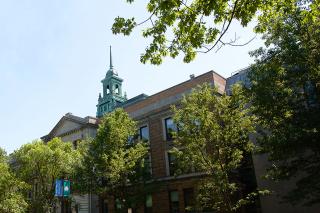
Simmons University announced today that Assistant Professor of Public Health John Quattrochi has been awarded a grant to study recent elections in the Democratic Republic of Congo (DRC).
Although the DRC has hosted three presidential elections in the past 15 years since 2006, research on the democratization of the nation has been limited to date – in part due to armed conflicts in the region. This project will help to address this gap and investigate the associations between economic growth, armed conflict, ethnicity, and votes for the incumbent candidate across the last three DRC presidential elections.
The project, funded by a grant from the Simmons Fund for Research and supported by two Simmons undergraduate students, will review DRC county-by-county data to analyze how support for the incumbent candidate varied geographically across the 2006, 2011, and 2018 DRC presidential elections. In addition, it will look at how various factors – such as economic growth, local armed conflicts and ethnic similarity to the incumbent – correlate with support for the incumbent over time.
“I am honored to receive this grant, which supports vital research that will advance our understanding of policymaking best practices and electoral accountability in new democracies – particularly where there has been civil conflict,” said Quattrochi, who is the director of the Simmons Master of Public Health program. “A better understanding of Congolese political development is important, as it can improve policies that aim to build peace and alleviate poverty in the DRC and in other regions facing similar circumstances.”
The DRC is a large and rapidly growing nation of global importance. From a humanitarian perspective, DRC is projected to be home to one-seventh of the global population living on less than $2/day by 2030, and conflict in DRC often spills over into neighboring countries (nine countries were involved in the Second Congo War, 1998-2003).
The research project will also test and challenge classic assumptions about why people vote for particular candidates.
“There are a limited number of new, post-conflict democracies from which to glean information from, so the field of political science will be enriched by this DRC research,” added Quattrochi. “As we think about policymaking and democracies, it’s crucial to understand why people vote a certain way and the factors that influence their decisions – especially because individuals don’t always vote in their own self-interest.”

